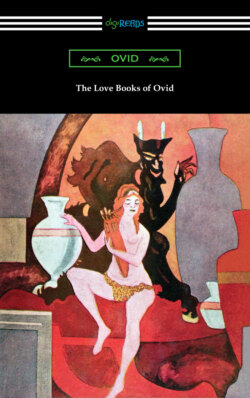Читать книгу The Love Books of Ovid - Ovid - Страница 15
На сайте Литреса книга снята с продажи.
ELEGY VII. HE CURSES HIMSELF FOR HAVING MALTREATED HIS MISTRESS.
ОглавлениеLoad my guilty hands with fetters, if thou be my friend, now that my anger has departed. Rage it was, look you, that made me raise my hand against my mistress. O madman that I was I To think it was my hand that made her weep! At that moment I would have struck my father and mother; nay, I would have rained blows upon the gods themselves.
But say. Did not Ajax, armed with his sevenfold shield, slaughter the flocks that he seized in the broad meads? And the ill-fated Orestes who, in his mother, wrought vengeance on his father, did he not take arms against the Dark Sisters? And could I, I of all men, dishevel her rangéd tresses? And did this mar my mistress’s beauty? Not so, she only looked the lovelier. In such guise they say the daughter of Schœneus, armed with her bow, pursued the beasts on Mænalus. In such a plight did Ariadne mourn, when she beheld the swift south winds bearing away both the sails and the promises of her perjured Theseus. Thus too, O chaste Minerva, but for the sacred fillets that bound her head, Cassandra had lain upon thy temple’s floor.
Who would not have called me a madman? Who would not have called me a barbarian? But never a word said she. Her tongue was paralysed with fear. Howbeit I read the mute reproach upon her face, and, though she spake not, her tears were my accusers. Oh, why did not my arms fall from my shoulders? It had been better had I lost a limb. ’Tis against myself that my violence hath turned, and my vigour hath been the instrument of my own torture. Wherefore do I need you more, ye ministers of crime and slaughter? Avaunt, ye sacrilegious hands, and with the fetters ye deserve, be laden. Why, had I struck the humblest Roman, I should have had to answer for it. Have I then more right to strike my mistress? The son of Tydeus left a hideous memorial of his wickedness. He was the first to raise his hand against a goddess. I am the second. And withal, his sin was not so black as mine. I struck the woman whom I said I loved; he did but wreak his fury on a foe.
Now, mighty conqueror, go and prepare thy triumph. Set the victor’s laurel crown about thy brows and on thy knees give thanks to Jove, and let the vast throng that grace thy chariot shout aloud, “Io triumphe!” And let thy poor victim fare sadly before thee, her hair unbraided, pale from head to foot but for the bruises on her cheeks.
Better it had been to have left upon her lips the imprint of my own, better that her neck should bear the traces of my loving teeth. Then, even though I was as violent as a mountain torrent, even if I was beneath the sway of blind rage, was it not enough to shout at the poor girl, without roaring out a torrent of horrible threats and tearing her dress from neck to girdle? ’Twas there my violence stopped? Nay, so hardened was my heart, that I dragged her along by the hair and in my barbarous rage I left the mark of my nails upon her dainty cheek. There she stood distraught, her face as white as Parian marble. I beheld her deathlike look, and her limbs trembling like the poplar leaf stirred by the sighing wind, like the slender reed which bends beneath the zephyr’s breath, like the wave whose surface is ruffled by the warm south wind. Her tears, long restrained, coursed down her face as the water floweth from the melting snows. ’Twas then I ’gan to feel the blackness of my guilt. Those tears of hers, what were they but my blood? Thrice I essayed to fling myself, a suppliant, at her knees. Thrice she thrust away my dreaded hands. “Lay on,” I cried, “and spare not. Vengeance win alleviate thy pain. Tear my face with thy nails, spare not mine eyes, no, nor my hair. Let rage lend strength to thy hands, weak though they be; or at least, to obliterate the sad traces of my crime, braid once more the tresses that my hand so cruelly disheveled.”
